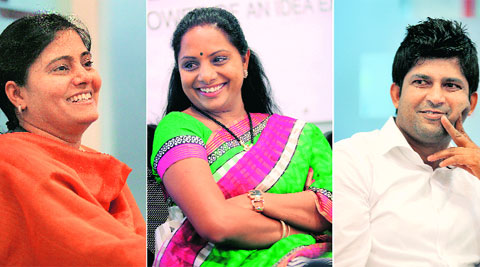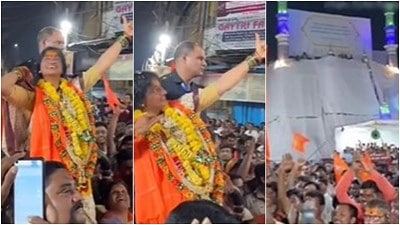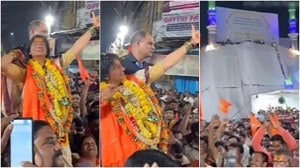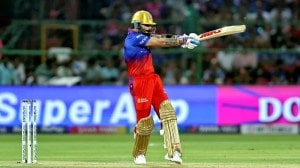- India
- International
‘No one guides us in Parliament’
First-time talk about the hurdles they face in Parliament and their views on J&K and Article 370.
 K Kavitha, Anupriya Patel and Pratap Simha
K Kavitha, Anupriya Patel and Pratap Simha
K Kavitha, Anupriya Patel and Pratap Simha, first-time MPs of TRS, Apna Dal and BJP respectively, talk about the hurdles they face in Parliament and their views on J&K and Article 370. This Idea Exchange was moderated by Senior Editor D K Singh
K KAVITHA: I am a Masters in Computer Science and I was part of the Telangana movement for seven years. I run an NGO called Telangana Jagruthi, and we have tried to revive ethnic festivals that are getting lost in these Valentine’s Day, Mother’s Day etc… After the formation of the Telangana state, our TRS party formed the government. Then I won the (Lok Sabha) election from Nizamabad. My area of interest, other than representing the aspirations of the people of Telangana, is the Jammu and Kashmir issue. I hope that this government, which has a massive majority, will take serious decisions and implement them.
ANUPRIYA PATEL: My journey is not very old in politics. I joined politics after my father’s demise in 2010, and 2012 was the first election of my life. I spent two years as an MLA and now I am an MP from Mirzapur, UP. One of my prime concerns is uplifting the living conditions of tribals in Mirzapur. There are other issues — the poor standard of education and medical facilities — which I will try to bring to the notice of the government. I’m one of the allies of the BJP, a very small ally with only two members in the House. So I have my party issues as well. My party is working for the backwards, tribals and Scheduled Castes. I feel the government is not giving attention to this aspect. I have tried to speak to the Prime Minister on these issues, that a major section of the OBCs and the SC/STs turned in your favour. They quit the SP, BSP, and turned to you because they found that you’re a man of hope.
Coming to Parliament is a great experience because now you know what a big responsibility it is and how the House works, the rules, techniques, devices. It’s an enriching experience and, as a young MP, exciting also. You become anxious because you don’t know lots of things and at the same time you feel good too because it’s such a big platform, the entire nation is watching you and you can learn and contribute so much.
PRATAP SIMHA: I represent Mysore-Kodagu constituency in Karnataka. I’m a Kannada journalist. My column is called Bettale Prapancha, which means ‘naked world’, it bares facts. I write on contemporary issues, sports, politics — anything, except science and technology. When the general elections were announced, the state and central BJP were looking for an image makeover, so they looked for achievers from other fields. Two or three names were announced, and one was mine. I’m also the biographer of the first unofficial biography of Narendra Modiji. I published it in 2008 and it was released by Arun Jaitley. It got translated into Gujarati and Marathi. That is how I came in contact with Modiji. My constituency comprises two districts, Mysore and Coorg. In one part of my constituency, they grow world-class tobacco, a majority is exported. Coorg is the hometown of coffee breweries. Mysore has eight engineering colleges, but only one major software firm. We need to provide jobs to graduates. Also, the road connectivity between Mysore and Bangalore is quite bad.

D K SINGH: As a first time MP, if there is one thing you could change about Parliament and parliamentarians, what would that be?
ANUPRIYA PATEL: The practice of using unparliamentary language in Parliament. I get disgusted when I see members use words or remarks which don’t befit the dignity of a parliamentarian.
K KAVITHA: The whole idea of politics has lost its dignity. I don’t think it is right because we work very hard. We respond to issues and problems. This is a very young Parliament, more than 300 people are below 40 or just about 40-45. With such freshness in Parliament, hopefully, the next five years will have better politics. I don’t know what I’ll exactly do because I’m only 15 days into Parliament. I’m learning, understanding the procedures. It’s a confusing, British kind of system. When you have to raise your voice there are hundreds of hurdles, but I’m trying to get my way. All of us spoke twice or thrice in Parliament, but it’s really difficult to get even a chance.
COOMI KAPOOR: Anupriya talked about dignity of behaviour. But Kavitha, you as a first timer, have already entered the well of the House and protested.
K KAVITHA: That is a democratic form of protest. Pepper (spray) is not. The stronger the issue, the more severe the protest would be. We went into the well because of the tribal issue (in connection with the Polavaram project). Nobody was willing to support us in any which way, so we had no other way than to go to the well.
PRATAP SIMHA: Of course, they’re supposed to fight for the rights of tribal people. They’re allowed to protest, but there is a space for discussion, which they did not use. Instead they protested, they went out of Parliament. Then Pappu Yadav comes straight from jail, and preaches to all of us. Since I’m a first-time MP, they should teach us. But instead of teaching manners, they’re teaching something else. We get irritated when they start interrupting the session. When Sadananda Gowda was presenting the Railway Budget, MPs from various states started interrupting. When Arun Jaitley was presenting the Budget, they were making fun of him.
ANUPRIYA PATEL: Some people have adopted this as a mechanism for cheap publicity.
K KAVITHA: If somebody’s making a speech, and people interrupt and comment, we should welcome it. Because the people who are sitting there represent lakhs of people of this country. Each one of us represents about 20 lakh people. Secondly, if people do not get justice in the highest House of this country, where else do we go? A sense of insecurity and hopelessness prevails when people like us walk into the well for the Polavaram project. For the past nine years, I myself filed cases in the Supreme Court. But still the state government keeps calling tenders, and the Central government gives national status to that project. And there are lakhs of primitive tribals who are getting killed in that project. People like us are bound to protest and that should be taken in the right democratic sense rather than as a publicity stunt.
ANUPRIYA PATEL: I think you misunderstood me. I was hinting towards things like what had happened a few days ago when two MPs hit each other. When the Railway Budget was being announced, Mallikarjun Kharge stood up and said, ‘I was rail minister for barely nine months, in nine months a baby is born’. No sooner had he said that than a series of cheap comments started. An MP sitting in front of me said that Kharge wants to have a baby at this age. Another MP said this old man is thinking of having a baby.
PRATAP SIMHA: An MP from West Bengal shouts out every word. When the Railway Budget was being presented, MPs from West Bengal created a ruckus. Only when Gowda spelt out how many projects he had given to West Bengal did they keep quiet.
D K SINGH: Being the son/daughter of a politician is an advantage. But do you think it also becomes a baggage because people have huge expectations from you and even if you do something great, it’s attributed to your parents?
K KAVITHA: It’s an advantage because whatever positive things come from my father (K Chandrasekhar Rao) are attributed to me. At the same time, I’m compared to him. He’s a very good orator. So whenever I pick up a mike, everybody, especially in Telangana, looks at me with expectation. The fear of failing is horrible and takes a toll on your own creativity. To come out of that shadow is very difficult. On a lighter note, people who cannot reach my father to either vent out their anger or appreciate him come to me. Somebody who’s really upset with my father will say, ‘Arre, his daughter is not good’. Politically, it’s an advantage because we already have our own agenda, set map, ideology. We practically grew up in a political atmosphere. I’ve seen people flocking around my father from my childhood. So I understand the dynamics of the system.
ANUPRIYA PATEL: I don’t fall in Kavita’s or Pratap’s category. Although my father (Sone Lal Patel) started the Apna Dal, the party didn’t achieve success. He was not an MLA or MP. He left me with the legacy of some votes which never converted into a powerful position. So I see myself as a beginner. There’s nobody in my party to guide me. But people perceive that Anupriya comes from a political background, so she knows all.
Pratap Simha: Having a political background certainly helps you on the way. If my father was a politician or had money, I would’ve gone to St Stephen’s or another good college. My English would have been better. I would have learned other languages, and studied in foreign colleges. Whenever I enter the premises of Parliament, there are a lot of photographers. No one takes our photographs. When Jyotiraditya Scindia comes in, some daughters and sons of great politicians, they’ll rush towards them, they’ll take their photographs. If I have to raise my voice in Parliament, I have to struggle to ask questions, or struggle during the zero hour. If there’s a quota in every job sector, in Parliament also, we should be allotted some time. Those who come up on their own should be allowed to speak.
Manoj C G: Kavitha, you said you feel strongly about Jammu and Kashmir. As young MPs, how do you feel about issues like Article 370 and the uniform civil code which are on the BJP’s agenda?
K Kavitha: Jammu and Kashmir and Telangana were both forcefully and at the same time annexed to the Indian Union. When I say I feel strongly, it’s because we were both separate countries, but were merged with the Indian Union after Independence. In 1947, we were not a part of India. After 1947, we became a part of India. Then the troubles really started. None of our people was very rich before. So it’s from the people’s perspective that I’ve started reading about Jammu and Kashmir. We need to solve issues, particularly the Kashmiri Pandits’ issue which is put up in the agenda of the BJP. They say we can all take them back home, but it is just a political statement. You have to create a safe environment before you take them there. We need to come out clean on Jammu and Kashmir. Few parts were not ours, we should agree, we should redraw the international lines, and move on. Development is suffering and you see frequent bombings.
Our economy takes a toll. Even in the Budget, almost Rs 2.50 lakh crore has been allotted to defence. If we have a peaceful environment in our bordering states, we don’t have to spend so much on defence. We can spend that money on education, women’s development or sanitation. Today, if I talk about no bathrooms in girls’ schools, I should be ashamed of being a citizen of this country.
MANOJ C G: What about uniform civil code?
K Kavitha: A lot of Muslim organisations are opposing it, but I am for uniform civil code. We cannot control anybody’s religion, but when it comes to law and order, to controlling the internal security issues, a citizen is a citizen and should be dealt with that way. So certain clauses need to be included in the uniform civil code, some could be debated about. Only the marriage clause could be excluded and dealt with separately.
ANUPRIYA PATEL: To me, this idea is very strange that we are a nation and we have a separate system in a state that falls within the boundary of the Indian Union. However, I totally agree where Article 370 is concerned. I heard the honourable PM say that, ‘Why can’t we talk about it? Why can’t we discuss it?’. I feel that there should be debate over Article 370, its existence and its relevance.
PRATAP SIMHA: As far as the uniform civil code is concerned, the BJP has a stated stand on this, I don’t want to talk more on this issue, and Modiji has called for a debate on Article 370. Has Article 370 achieved what it intended to? If a Kashmiri woman marries someone not from J&K, her children will not have the right to her property. We need to raise our voice against this kind of discrimination. There are no industries in Jammu and Kashmir because they will not allow the industries to flourish there. And in 2009, during the Amarnath Yatra, the pilgrims were not allowed to have a permanent structure there.
K KAVITHA: On the issue of not owning land or property, Kashmir and Telangana have similar laws. We also had a condition, a council, which said that no outsider could hold land in Telangana. But when N T Rama Rao came to power and scrapped the council, he violated the Constitution, nobody was there to hear our voice, it’s all gone. But Kashmir still has that law and council, so natives have that protection. But when you want to completely remove it, we have to seriously think of the capacity of the natives regarding the issue. The same thing we had in Telangana, but once it was removed, we suffered very, very seriously. So when we are talking about the property rights of Kashmiris, the opinion of the natives should be sought.
Manoj C G: A contentious issues in this Lok Sabha has been the grant of Leader of the Opposition status to the Congress. Is LoP an integral part of parliamentary democracy or can you do away with an LoP this time?
K Kavitha: I think LoP can be given to the Congress. In a parliamentary democracy, things can never be one-sided. We can definitely go out a little bit, stretch out a little more, have a bigger heart, chappan inch ka seena hai toh zara dil bhi bada karein (a 56-inch chest should have a large heart).
Pratap Simha: If they (TRS) are so generous, they would have merged their party with the Congress. They went back on their word and they are preaching to us. Also, why should we give LoP to the Congress? 1952 to 1969, there was no LoP.
RAKESH SINHA: In 1984, when the Congress had a huge mandate, there was a party which was denied the Opposition status.
K KAVITHA: Could be. But I’m saying in this era, we should give voice to every section.
Anupriya Patel: A voice to every section does not mean that the Congress should have LoP status just because it is a national party and has been in power for the past 10 years. They don’t deserve, so they should not have. Democracy is not about generosity, it’s about rules and regulations.
Raghvendra Rao: You mentioned the hurdles you face as first-time MPs in Parliament. Can you cite instances?
Anupriya Patel: When you first come to Parliament, you don’t know how it conducts itself. The first thing you get is the list of businesses, and 90 per cent of the things you don’t understand. We didn’t know what was happening when, what we were supposed to do. And the biggest anxiety was that you’ve gone there as an MP, and people have too many expectations from you because they want you to speak. And you don’t know how to grab that opportunity to speak. No one guides you in Parliament. All these old MPs don’t want to guide you.
So you don’t know, Parliament mein kahan se jaana hai, kahan se nikalna hai, you have to learn everything. I kept going to Central Hall and asked people, ‘Where have you come from, what are you supposed to do?’.
In the debate on the President’s address, I asked so many people, what is the actual process. Even the seniors couldn’t exactly tell me the way, how to participate. Ultimately, I had to find the way myself. I did many experiments to grab that opportunity to speak. So I was happy when I finally spoke. You are supposed to speak on the Railway Budget, on the General Budget. So you read a lot of literature, anaylse things, then you get only three minutes. What are you supposed to say in three minutes?
Pratap Simha: Last Wednesday, mine was the first question to be asked. So the Speaker called my name, I stood up and started reading the question. I was supposed to stand up and say the question number. I didn’t know this procedure and no one told me too. Everybody started laughing at me, instead of guiding me. I was tense, and these people started laughing… and then people like Pappu (Yadav) start laughing at you… Every time he rushes to the well of the House, Pappu’s wife is also there.
When the Railway Budget was initiated and Sadananda Gowda was not in the House, everybody started shouting that until he comes in, we will not initiate the debate, till then the House should be adjourned. One guy from Aam Aadmi Party, Pappu Yadav and one guy from Kerala, they were creating a lot of problems till Gowda came and sat down. Suddenly I turned around and the Aam Admi guy had disappeared. And the Communist party guy was snoring.
K Kavitha: I hired somebody who knows the procedures, and I sat for tuition for two full days to understand the procedures. I have a background in computer sciences, I don’t know the Budget also, numbers give me tension, so I took tuitions for two-three days to understand the Budget. One good thing about this Parliament is that I have seen many people sitting there from morning till evening. The session was on till 8:30 pm and people were still sitting there. As first timers, we are trying to learn. Sitting in the House from morning till evening, I think we are trying to learn.
ABANTIKA GHOSH: Pratap, when the Supreme Court upheld Section 377 for consensual sex among gay couples, your party was the first to come out in support, and today the Health Minister said that the government should protect everybody’s rights, including that of the gay people. So does that mean your party is having a rethink on it?
Pratap Simha: Don’t put me into trouble, thank you. I don’t want to talk about that subject.
Transcribed by Pallavi Pundir and Nikita Puri
Apr 18: Latest News
- 01
- 02
- 03
- 04
- 05






































